|
| Two recent cataclysmic changes in the international recycling market are having a dramatic impact on the world of recycling.
- Asian markets are drying up, and prices are dropping. See article below, “Market Forces Put America's Recycling Industry in the Dumps,” “It all stems from a policy shift by China, long the world's leading recyclables buyer. At the beginning of the year it enacted an anti-pollution program that closed its doors to loads of waste paper, metals or plastic unless they're 99.5 percent pure. That's an unattainable standard at U.S. single-stream recycling processing plants designed to churn out bales of paper or plastic that are, at best, 97 percent free of contaminants such as foam cups and food waste.”
- Contaminated recycling is no longer saleable. Again, see article below, “Market Forces Put America's Recycling Industry in the Dumps,” “In the early days of recycling, people had to wash bottles and cans, and sort paper, plastic, glass and metal into separate bins. Now there's single-stream recycling, which allows all recyclables to be tossed into one bin. While single-stream has benefited efficiency, and customers like it, it's been a challenge on the contamination side.”
If we are going to continue to operate a viable recycling program to divert waste from landfills, some long term changes have to be made. Meanwhile, the most important change we have to make is to clean up our recycling habits, the worst of which is paying little attention to what we put into that blue bin.
Our waste collection contractor is Republic Services, which picks up recyclables at homes and businesses. The recyclables are then processed at The Integrated Resource Recovery Facility, or IRRF (opened in 1996), a recyclables processing facility located just off the Richmond Parkway at 101 Pittsburg Avenue in North Richmond. The IRRF is operated by West County Resource Recovery Inc. a division of Richmond Sanitary Service.
Recently, Republic Services was the target of some criticism for charging penalties for contaminated recycling bins. There are a number of photos below of contaminated recycling bins.
What we all have to do now is pay careful attention to what goes into those recycling bins. The Guide below is provided to every Republic Services customer annually, and additional information is provided in bills. There is even more information on the RecycleMore website, the Republic Services website and the City of Richmond website. A comprehensive guide is on the City of Richmond website at https://www.republicservices.com/cms/documents/municipality/ca/contra-costa-county/comprehensive-recycling-guide.pdf.
New information with details about cleaning food residue from recyclables and avoiding other contamination can be found here and here.
A simple Guide is shown below.
Some of the fine points of recycling and what can and can’t be placed in the blue bin that most of us don’t know include:
- Plastic bags can placed in the blue bin, but only if they are tightly bagged together.
- Expanded polystyrene (Styrofoam) can be recycled, except for packing “peanuts.” Two versions of the Guide have inconsistent information on this.
- Those “biodegradable” and “compostable” plastic cups and utensils made from corn starch and other natural material cannot be composted at Republic Services facilities and cannot be placed in the blue bin. When you think you are being green by using “compostable” plastic (polymer) items made from plants, this actually creates more waste than conventional plastic.
- Bottles are recyclable, but bottle caps aren’t.
- Glass bottles and jars are recyclable, but drinking glasses, mirrors and window glass aren’t.
- Many paper products are recyclable, but food contaminated paper products, napkins, paper plates, tissues and paper towels aren’t. These can, however, go in the green bin.
- Food contaminated containers, like catsup bottles, must be rinsed out.
All of this is very, very confusing, but we are going to have to work it out and provide effective education.
Long term, I recommend:
- Using legislation and a carrot and stick approach, strengthen the domestic recycling market so that all recycling can be absorbed within the US, or at least North America, without depending on international markets. Require minimum recycled content of plastic and metal products. Make producers financially responsible for recycling their products, including packaging.
- Reduce the amount of packaging for products. Think about even taxing packaging to incentivize reductions.
- We need a lot of education on how to recycle under the new paradigm.

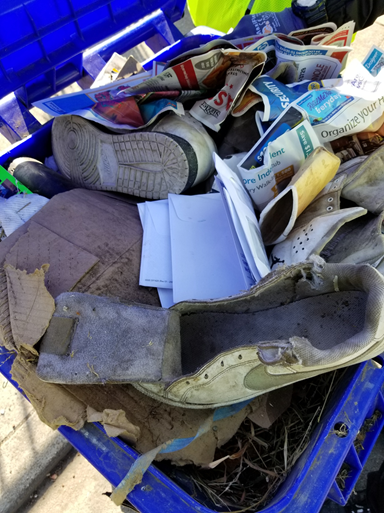
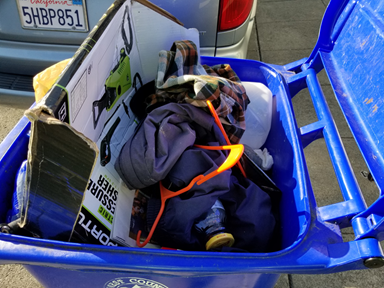

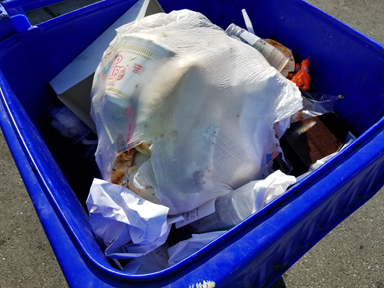
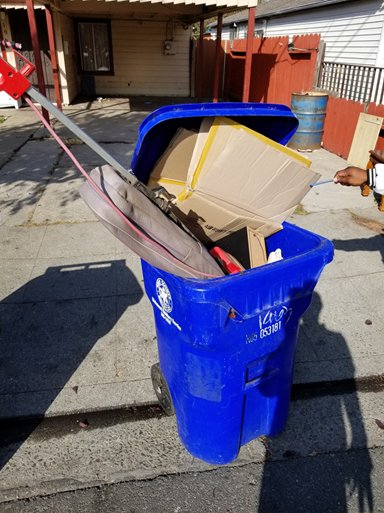
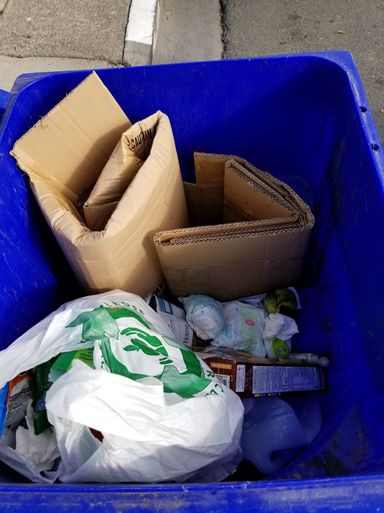
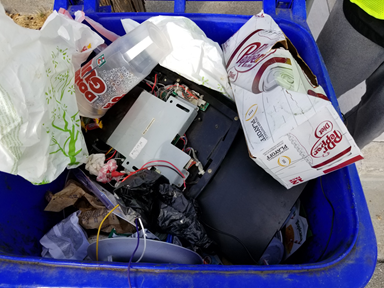
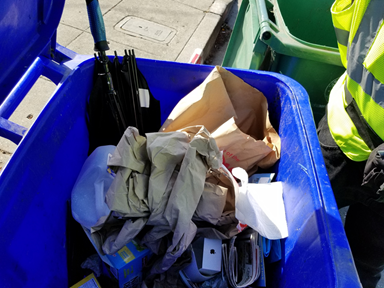
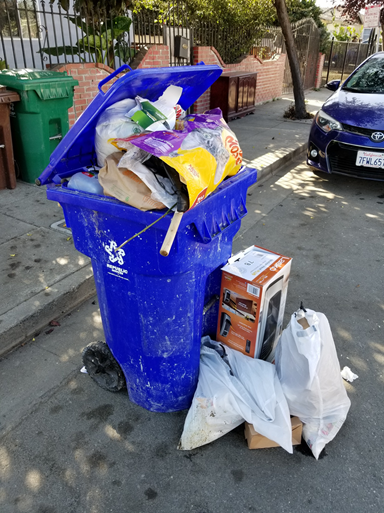
Market Forces Put America's Recycling Industry in the Dumps
Recycling programs across the United States are shutting down, scaling back or costing more because of a global market crisis caused by China closing its doors to most recyclables.
Oct. 10, 2018, at 10:32 a.m.
In this Thursday, Sept. 6, 2018, photo, Ben Harvey, an owner at EL Harvey & Sons, a waste and recycling company, poses on bundles of residential mixed fiber, comprised of a variety of paper and cardboard, in Westborough, Mass. The company is currently stacking and holding onto about 2,500 tons of the material, which is awaiting a destination where a recycler will process the bundles. Recycling programs across the United States are shutting down or scaling back because of a global market crisis blamed on contamination at the curbside bin. (AP Photo/Charles Krupa) The Associated Press

By MARY ESCH, Associated Press
ALBANY, N.Y. (AP) — America's recycling industry is in the dumps.
A crash in the global market for recyclables is forcing communities to make hard choices about whether they can afford to keep recycling or should simply send all those bottles, cans and plastic containers to the landfill.
Mountains of paper have piled up at sorting centers, worthless. Cities and towns that once made money on recyclables are instead paying high fees to processing plants to take them. Some financially strapped recycling processors have shut down entirely, leaving municipalities with no choice but to dump or incinerate their recyclables.
"There's no market. We're paying to get rid of it," says Ben Harvey, president of EL Harvey & Sons, which handles recyclables from about 30 communities at its sorting facility in Westborough, Massachusetts. "Seventy-five percent of what goes through our plant is worth nothing to negative numbers now."
It all stems from a policy shift by China, long the world's leading recyclables buyer. At the beginning of the year it enacted an anti-pollution program that closed its doors to loads of waste paper, metals or plastic unless they're 99.5 percent pure. That's an unattainable standard at U.S. single-stream recycling processing plants designed to churn out bales of paper or plastic that are, at best, 97 percent free of contaminants such as foam cups and food waste.
The resulting glut of recyclables has caused prices to plummet from levels already depressed by other economic forces, including lower prices for oil, a key ingredient in plastics.
The three largest publicly traded residential waste-hauling and recycling companies in North America — Waste Management, Republic Services and Waste Connections — reported steep drops in recycling revenues in their second-quarter financial results. Houston-based Waste Management reported its average price for recyclables was down 43 percent from the previous year.
"A year ago, a bale of mixed paper was worth about $100 per ton; today we have to pay about $15 to get rid of it," says Richard Coupland, vice president for municipal sales at Phoenix-based Republic, which handles 75 million tons of municipal solid waste and 8 million tons of recyclables nationwide annually. "Smaller recycling companies aren't able to stay in business and are shutting down."
Kirkwood, Missouri, announced plans this summer to end curbside recycling after a St. Louis-area processing facility shut down. Officials in Rock Hill, South Carolina, were surprised to learn that recyclables collected at curbside were being dumped because of a lack of markets. Lack of markets led officials to suspend recycling programs in Gouldsboro, Maine; DeBary, Florida; Franklin, New Hampshire; and Adrian Township, Michigan. Programs have been scaled back in Flagstaff, Arizona; La Crosse, Wisconsin; and Kankakee, Illinois.
Other communities are maintaining recycling programs but taking a financial hit as regional processors have raised rates to offset losses. Richland, Washington, is now paying $122 a ton for Waste Management to take its recycling; last year, the city was paid $16 a ton for the materials. Stamford, Connecticut, received $95,000 for recyclables last year; the city's new contract requires it to pay $700,000.
A big part of the problem, besides lower commodity prices overall, is sloppy recycling.
In the early days of recycling, people had to wash bottles and cans, and sort paper, plastic, glass and metal into separate bins. Now there's single-stream recycling, which allows all recyclables to be tossed into one bin. While single-stream has benefited efficiency, and customers like it, it's been a challenge on the contamination side.
A tour of Republic's facility in Beacon, about an hour's drive north of New York City, makes the challenges clear. A third of the material dumped by collection trucks is non-recyclable "contaminants" such as garden hoses, picnic coolers and broken lawnmowers. Workers have to pull that out and truck it to a landfill, adding to overall costs. Plastic bags contaminate bales of other materials and tangle machinery. Spilled ketchup and greasy pizza boxes turn otherwise marketable material into garbage.
"The death of recycling was completely avoidable and incredibly easily fixed," says Mitch Hedlund, executive director of Recycle Across America, which advocates standardized labeling on recycling bins so people understand what goes in and what doesn't.
A range of initiatives have been launched to get people to recycle right. Chicago is putting "oops" tags on curbside recycling bins with improper contents and leaving them uncollected. Rhode Island is airing "Let's Recycle Right" ads.
While some recyclables have been diverted to other Asian markets since China's closure, there are also signs of market improvement in the U.S. to offset the lost business, said David Biderman, CEO and executive director of the Solid Waste Association of North America. He noted Chinese paper manufacturers that had relied on recyclables imported into their country have recently purchased shuttered mills in Kentucky, Maine and Wisconsin.
Meanwhile, recyclable materials processors are re-negotiating contracts with municipalities to reflect the fact that prices paid for recyclables no longer offset the cost of collecting and sorting them.
"What we're advocating is to step back and re-look at recycling," Republic's Coupland said. "This is the new normal. The model no longer funds itself."
|

